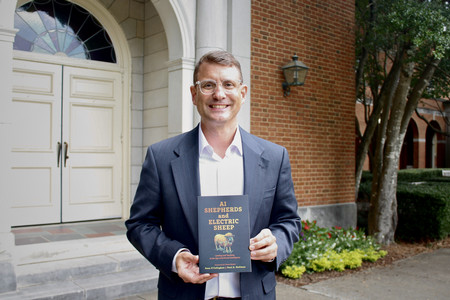
As artificial intelligence continues to transform education and the broader world, faculty in Samford University’s Howard College of Arts and Sciences are leading the way in helping students think critically and ethically about its implications. Across disciplines ranging from biblical studies to chemistry, professors are integrating AI into their teaching and research while also considering how it shapes human learning, vocation and intellectual development.
“Howard College is uniquely positioned to help students explore both the possibilities and ethical questions of AI,” said Dean Dawn McCormack. “There’s vast potential for scholarship, from using AI to studying its impact across STEM, social sciences and the humanities. At this early stage of AI development, students need hands-on experience and a critical understanding of its challenges and implications for humanity.”
Paul Hoffman, associate professor of biblical and religious studies and director of the Preministerial Scholars Program, has become a national voice in Christian engagement with AI. Recently featured on NPR and PBS, Hoffman co-authored a new book, AI Shepherds and Electric Sheep, which explores how pastors and ministry leaders can use AI in ways that promote human flourishing while guarding against its misuse.
“AI can be a tool that helps us fulfill our God-given vocations,” Hoffman said. “But if we are not careful, it can become a crutch that might supplant the use and development of our intellectual and creative capacities and thus hinder our ministries.
While Hoffman acknowledges AI’s value for research and editing, he draws a strong line when it comes to sermon writing. “As God's image bearers, God has uniquely given humans the agency and authority to serve as his vice regents in the world,” he said. “We are not to abdicate those gifts and responsibilities to intelligent machines.” He hopes students in the Preministerial Scholars Program will learn to reflect deeply and biblically on how emerging technologies affect their spiritual lives and callings.
In the Department of English, professor and chair Brad Busbee has encountered both the challenges and opportunities that AI presents in the classroom. Busbee has seen an increase in plagiarism cases related to AI-generated essays and a decline in students’ willingness to engage in close reading. “It’s tempting to get help from ChatGPT,” he said, “but students are quickly learning that the cheating is easy to spot.”
He worries that some students rely on AI summaries and miss the “hard but rewarding work” of reading for themselves. However, Busbee’s own research has been revitalized by AI. As part of an international project focused on 19th-century Danish theologian N.F.S. Grundtvig, he is using handwritten text recognition software to transcribe tens of thousands of pages of difficult handwritten texts. “This is something we could hardly imagine just a few years ago,” he said. “It opens up access to voices and ideas that have remained hidden because the handwriting was too complex to decode.”
GIVE: Support impactful work at Howard College of Arts and Sciences.
